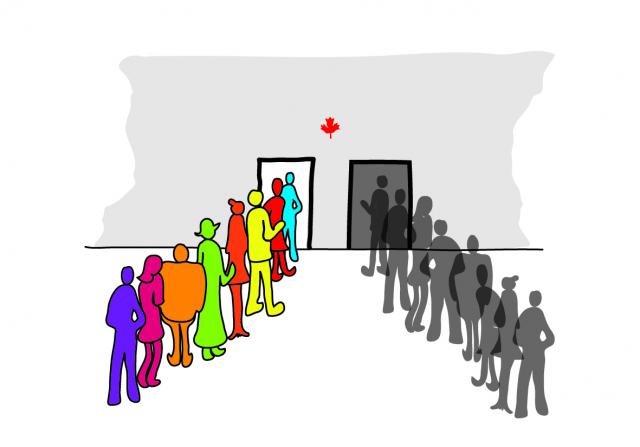- Access to protection for trafficked persons
- Recent changes: Increased vulnerabilities
- Health care coverage
- Migrant workers and trafficking

Access to protection for trafficked persons
Canadian law does not protect non-citizen trafficked persons. Currently, women, children and men who are trafficked into or within Canada often fall between the cracks in the system. Detained and deported, they may be treated more as criminals than as victims of a crime.
- Current laws relating to trafficking in persons criminalize trafficking by punishing traffickers, but do not protect the rights of trafficked persons specifically.
- Existing measures to regularize the status of trafficked non-citizens, such as Temporary Resident Permits (TRPs), refugee claims, and applications for humanitarian and compassionate (H&C) consideration, do not provide adequate protection for all trafficked persons who need it. There is a need for clearer statutory protection for trafficked non-citizens.
Temporary Resident Permits
TRPs offer trafficked non-citizens a legal immigration status, albeit temporary. They are currently the main avenue to protection offered under Canada’s immigration law.
Despite their many positive features, experience has shown that there are continuing gaps in access to protection and rights for trafficked persons.
Other Avenues to Regularization
Refugee claims: In some cases trafficked persons’ situation corresponds to the refugee definition and they may be recognized as a refugee.
H&C applications: A trafficked person may also apply to remain in Canada on H&C grounds to allow for consideration of the hardship their trafficking situation in Canada has caused them.
Recent changes: Increased vulnerabilities
Recent changes to immigration and refugee policies have created new barriers for trafficked persons to access status in Canada, leaving them even more vulnerable.
Changes to the law may limit trafficked persons’ access to:
- TRPs;
- Humanitarian and compassionate (H&C) applications;
- Refugee determination system:
> Pre-removal risk assessments to consider their risk on the basis of new information revealed after they escaped their traffickers;
> Short timelines to prepare for a refugee hearing and to find legal representation.
These changes may facilitate the arrest and deportation of trafficked persons instead of providing pathways to status and protection.
Health care coverage
 After recent cuts to the Interim Federal Health Program (IFH), only trafficked persons with TRPs have access to full health care coverage. Non-citizen trafficked persons without a permit only have limited access to health care services.
After recent cuts to the Interim Federal Health Program (IFH), only trafficked persons with TRPs have access to full health care coverage. Non-citizen trafficked persons without a permit only have limited access to health care services.
Since access to TRPs for trafficked persons is quite limited in practice, many survivors of trafficking are left without access to necessary medical services and counselling that will help them recuperate and regain control over their lives. In the absence of federal coverage, access to health services depends on individual provinces’ or territories’ conditions.
Physical and Mental Health Impacts of Trafficking
At each stage of the trafficking experience women, men and children may face psychological, physical and/or sexual abuse.
The physical and mental health risks and impacts are often long-standing and vary by the type of work carried out, whether involving sexual or labour exploitation.
Health services are therefore crucial for trafficked persons regardless of their immigration status.
Migrant workers and trafficking
 Migrant workers are particularly vulnerable to exploitation and human trafficking, because they lack legal and social protections.
Migrant workers are particularly vulnerable to exploitation and human trafficking, because they lack legal and social protections.
In Canada, the structure of the Temporary Foreign Worker Program has created opportunities for the exploitation and abuse of migrant workers, increasing their vulnerability to trafficking.
Specifically, temporary foreign workers in Canada have limited access to protection because:
- Work permits are tied to a single employer
- Workers are isolated and lack access to information on their rights
- The Canadian and most provincial governments do not ensure monitoring of temporary
foreign workers’ workplaces.
Legislative amendment is needed to bring a permanent and fundamental change in policy so that trafficked persons in Canada are protected.
